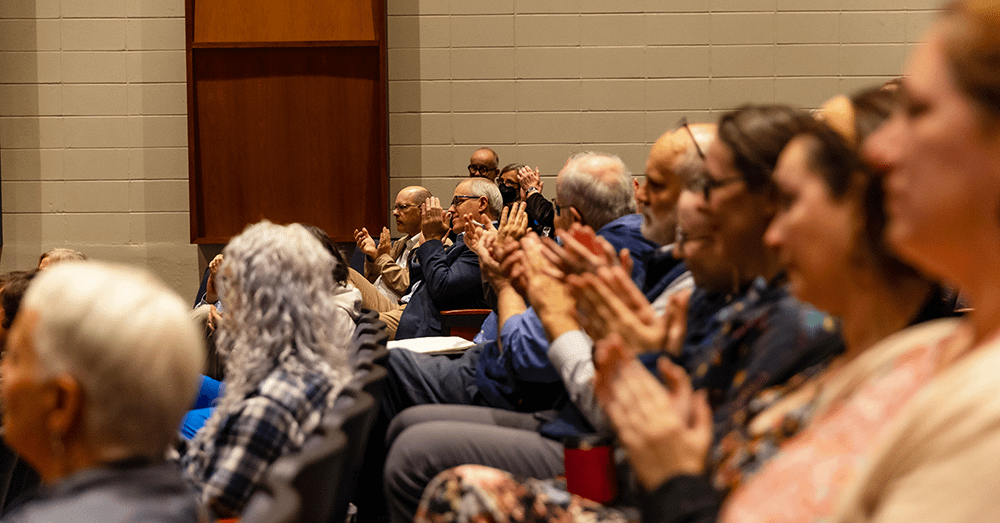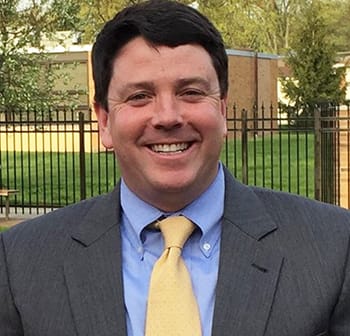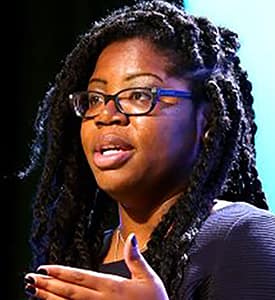Judge Cioffi during MLK week
Judge Cioffi offers food for thought on judicial change
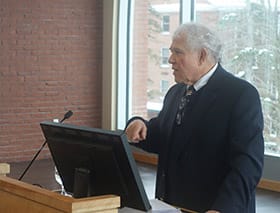
Directly above is a close-up view of Cioffi speaking. Below, he talks with Saint Michael’s President Lorraine Sterritt that their table during lunch. (photos by Mark Tarnacki)
Judge Nicholas Cioffi ‘61 said Saint Michael’s College has changed profoundly since he was a student from 1958 to 1961, and so has America’s judiciary and bar, for better and worse.
During one of several MLK Jr. Week events this week, the distinguished longtime jurist and prominent Connecticut public official told his lunchtime audience in the Dion Family Student Center Roy Room Wednesday that the proper role of courts is simple, based on history: “They resolve disputes.”
He proceeded to take the audience through an efficient history lesson of the legal system from Germanic tribes in England sitting round fires deciding disputes – basically the first juries of peers – to English Shires and sheriffs and bailiffs, to the American concept of jury trials in our democracy.
“It’s very democratic … it’s a right reserved to the people,” he said of the power to pass judgement in the U.S., explaining that when a jury renders a verdict, it’s non-appealable given that the only right to appeal is of a ruling of a judge during a trial.
The substance of Cioffi’ s talk followed a minute or two at the start recalling his Saint Michael’s days as a classmate of U.S. Sen. Patrick Leahy ’61 — back, he said, when St. Mike’s had an all-male student body of maybe 1,000 men, most living on campus. Both the future judge and future senator were political science majors. The cafeteria, he recalled, had just one offering at any given meal, so students either ate it or stayed hungry. Yet, even with such relative austerity, “It was a great experience and it produced a real strong sense of community,” he said, noting that he has enjoyed returning for several class reunions, and is closing in on a 60th in 2021.
Looking back and forward
The guest speaker’s talk was titled “Changes by and within the Judicial Branch of Government and Some Thoughts about Further Change.” Cioffi discussed the changing composition of Judiciary and the Bar, exploring common and statutory law from 1964 to present that substantially impacted the rights of residents of the U.S. He also suggested possible changes to be considered on a going-forward basis.
The judge said some of America’s major pivot points in the judiciary in the last 60 or 70 years included Truman’s order to integrate the armed force in 1948, Brown vs. Board of Education’s ruling on the integration of schools, the 1966 Miranda Case and other rulings that profoundly changed the procedures in criminal courts relating to arrests. “Then we moved into other areas,” he said, including voting rights and the expansion of civil rights after the landmark 1964 Civil Rights legislation passed, reapportionment, privacy rights, and Roe vs. Wade. “Our rights don’t come from the Constitution, though they are stated there,” he said, noting that these rights are rather established through such cases, legislation and precedents.
Cioffi explained that he wanted to cover this important history relatively quickly in his talk so he would have more time to zero in on contemporary problems and questions that every citizen should face and consider regarding the judiciary, particularly the Supreme Court.
Two things in particular “hit me pretty hard” in thinking about what to say, he said. First is that the high court is “a closed club” with all Ivy League graduates on it – one won’t find Saint Michael’s or state public school graduates from different parts of the country, for instance, though that would better represent the population and wider views on issues. It’s worth questioning also, he said, if it is such a great thing that justices and judges are virtually always lawyers — though that is not required anywhere in the Constitution or law. He noted how the esteemed Supreme Court Justice Earl Warren was a governor of California with no judicial experience before joining the high court. Today, “You’ve got a very narrow group of people controlling a major portion of your government and rights” — and it’s probably not a democratic selection within that group
“Today it has become c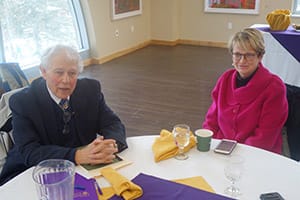 ompletely politicize, and that is something you should be very concerned about,” Cioffi said, no matter whether one is from the far right, far left or in between politically, he said, since anyone going before any tribunal has a reasonable expectation of impartiality. But now, “you know how they are going to vote” and nobody anymore breaks party lines on the court, as once was true.
ompletely politicize, and that is something you should be very concerned about,” Cioffi said, no matter whether one is from the far right, far left or in between politically, he said, since anyone going before any tribunal has a reasonable expectation of impartiality. But now, “you know how they are going to vote” and nobody anymore breaks party lines on the court, as once was true.
Another thing that should concern citizens, the speaker said, are the numbers and other sobering realities surrounding jury trials in America today: For instance in his home state, Connecticut, about 135,000 cases that were filed were eligible for jury trial out of a population of 3.5 million, with 177 judges to deal with the situation. Of those, about 560 cases had jury trials. “We’ve made it complicated, laborious and it’s expensive” to go to trial, he said, adding that the middle class gets the worst of it since, based on income, they are not eligible for public defenders (who actually are the best lawyers in the system as Cioffi sees it,) yet they cannot really afford expensive private attorneys as the wealthy can, and so come under great pressure to plea bargain.
Cioffi also sees and anticipates more big changes in our courts, with the role of females within the system increasing dramatically — more than half of law students and a lot of judges are now females, and minorities are starting to poor into the judicial system too, he said. While those feel like positive changes in a general way, though quantifying and qualifying those changes meaningfully can be hard.
After the judge spoke, several audience members had questions during a Q&A session:
- Edmundite Fr. Brian Cummings asked about side judges in Vermont, noting that many of them are not or were not lawyers — an example was the late Saint Michael’s journalism professor and PR Man John Donoghue.
- Sociology Professor Robert Brenneman had an exchange with the judge about mass incarceration and its racially unbalanced and unfair underpinnings in our society. Cioffi said he feels this is a societal issue, and that we need to change inequities in society – and the judicial branch doesn’t have the power to change today’s reality in that area. “But I think it has to be corrected,” he said.“We talk about integration mainly regarding schools, but we haven’t integrated the communities, and I think that’s where the change has to come.”
- Moise St. Louis, associate dean of students/director of The Center for Multicultural Affairs and a chief faculty/staff organizer of the week’s MLK events, asked the judge about the jury system and if it really allows all to justice from a jury of true peers. Cioffi said the courts do a good job in this area with the jury selection process we have, and he feels it is mostly fair since each side can reject quite a few potential jurors for any reason — though it is time-consuming.
- The speaker also spoke with concern of the backup of 900,000 cases waiting to be processed at the nation’s border. “It’s staggering when you see numbers like that, and it means the system is not working and we’ve got to change it. It’s up to you to come up with the solution.”
- He said the U.S. essentially has “an aristocracy of power today” with a ruling class of senators and congressmen and judges, “and they’re not going to give up willingly.” He also said that in law school from his experience the best students were the engineers because they thought with the precision necessary to the law. “Political power is the ability to control somebody else’s behavior,” he said.
- He also encouraged the idea of restorative justice that has gained growing currency in Vermont and on the Saint Michael’s campus, saying, “most situations can be handled pretty accurately through it – I think we need more of that.”
As a Saint Michael’s political science graduate, Cioffi went on to receive his Juris Doctorate from the University of Connecticut School of Law in 1964. From there, he served as a trial lawyer, mainly focusing in criminal law, from 1964-1975 when he was appointed to the Connecticut State Judiciary. In 1987 he was voted the Trial Judge of The Year by Connecticut Trial Lawyers Association. In 1989, Cioffi became the Chief Administrative Judge of Civil Division of Connecticut State Courts and then served as the Commissioner of the Connecticut Department of Public Safety from 1991-1995. From 1998-1999 he was the Chairperson of Connecticut’s Commission on Human Rights and Opportunities. He now serves on the Board of Directors for Conair Corporation (a privately held large corporation). He also has approximately 23 years of teaching experience in constitutional, criminal, and other law at various colleges and law schools.


